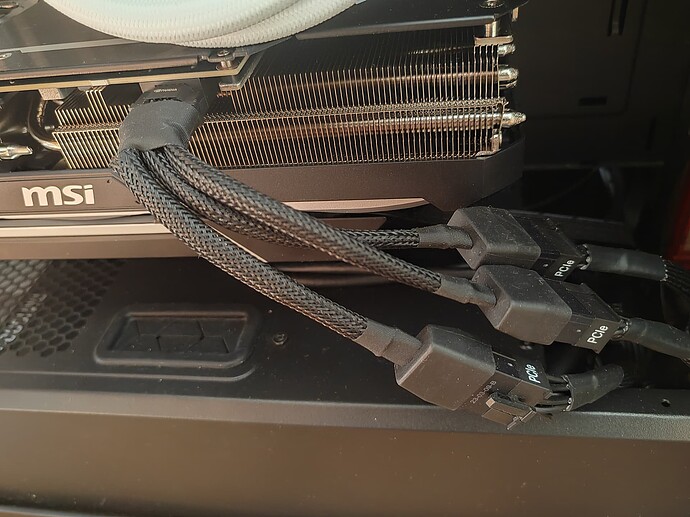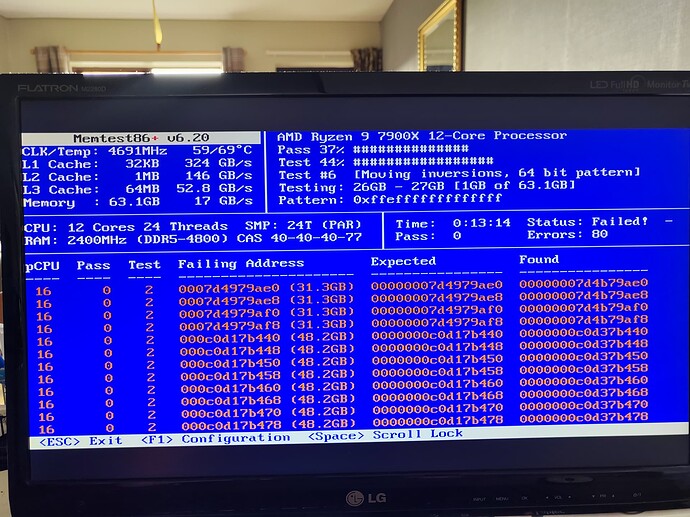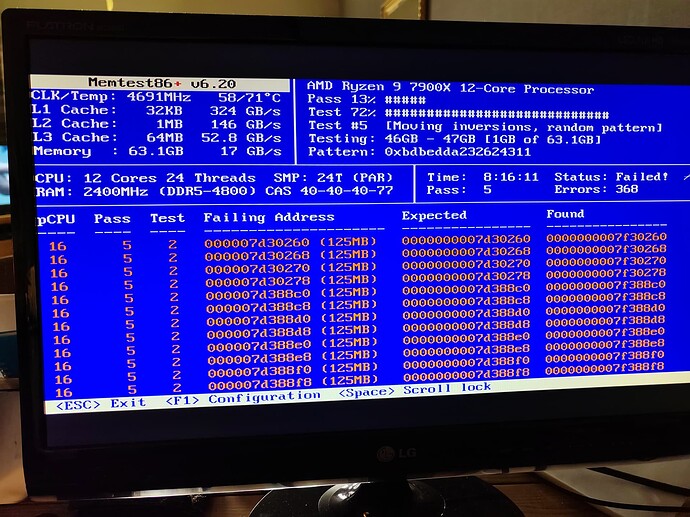The ram is running at 4800mhz, but I might manually reduce that bit by bit to about 4000mhz and see if that has any effect
Yes, restarted PC in Safe mode then ran the DDU with windows update turned off and Internet disconnected
How is your cooling? Check temperatures of CPU, GPU, case etc. ![]()
That‘s what I did initially, too, with a 4080, it wasn‘t stable. I got a new cable from BeQuiet in my case and everything was good after that.
Right, thanks. Well, first of all, you’ll have no problems with that PSU (unless faulty). I have a Corsair 1000W running a 4090 + i9 13900K overclocked and I have zero problems there. If you’re powering each of the legs of the power adapter from a separate output from the PSU, then there should be no issue , although I personally prefer a purpose-made cable because it’s neater.
That Windows 11 will BSOD, but Windows 10 does not, means there must be something different in how your hardware is used between the two of them. Win11 does use some features of modern CPUs that Win10 doesn’t. I would personally not be willing to accept a situation where Win11 just doesn’t run on my hardware. BSODs mean something, usually hardware issues, and that’s something I would have to address for my own peace of mind. I strongly suspect that your MSFS problem ultimately stems from the same thing that causes Win11 to blue-screen, so if you could get Win11 stable on your system, that would be a positive step.
Unfortunately, at this point I think your only real option is to assume that something is faulty in your hardware, and test accordingly. If you have a different GPU available, try with that. But most people don’t have spare RAM or disks or a CPU lying about. A motherboard fault can be extremely difficult to diagnose, generally the only way to do it is to replace the MB and see what that does, but most retailers won’t accept an RMA without evidence of an issue.
Oh, and the Microsoft ‘support’ you’re getting is worthless. But I guess you already knew that ![]()
This is from the beta SU13. OP is on SU12.
Personal Comments and Observations
The approach I’ve taken over the years is to replace one major subsystem at a time. Having read through this, it really sounds like an integration / component failure. Unfortunately if it was a ground up build all the way from the Mobo onwards, there’s not a baseline that’s entirely stable to troubleshoot from. Typically if the rig was working before hand in a the old configuration - you replace piecemeal one component at a time (i.e., GPU) and then run a burn-in period to confirm stability. Then move on to the next component.
Perhaps an error on my behalf this time round. I’ve always done self builds and with no issues, but I guess as technology becomes ever more complex further research is required.
I did the research as I normally do, but this setup has proven so far a no go.
I appreciate all the advice and suggestions, but I literally don’t know what avenue to go down with all this. I’ve had a couple days away from it and will try and salvage some sanity from it all.
If you all come across a post title “MSFS was a no fly zone, but the PC did out the window” you’ll know the reason without reading the post itself.
I’ve been self-building PCs for 30+ years and while I do sometimes upgrade a system it’s much more common for me to build complete new systems and relegate the old ones to some other task. 99 times out of 100 that works fine. It’s just the luck of the draw that occasionally you’ll get a duff part. It’s even more unlucky when it’s broken in such a way that the system works, but isn’t stable. That’s the worst kind of faulty, because you have to assume initially that it’s software / drivers etc.
I had memory problems for the first time in forever this year. Built a 12900K system last year with DDR5 which I’d never used before, went with DDR5-6200 because why not, and all was fine; upgraded the CPU to a 13900K (because I’m a glutton for punishment), and afterwards I started having occasional CTDs in MSFS. Only very occasional, but always similar. Sim would lock up, freeze in place, and then CTD. Windows was totally stable (apparently). Now I had only just added a further 32GB of RAM, and while I had used the exact same modules that I already had 32GB of, I began to suspect an issue there. MemTest did indeed reveal errors. I re-seated the RAM and the tests passed. OK. But a few months later, same problem again. Ultimately I just took the RAM off XMP timings and went default and ran it at 4800Mt/s and now it’s rock-solid. I could probably ramp it up to nearer to 6200 again, but it seems like the 13900K + overclock + RAM at 6200 combo just isn’t reliable for me.
If I had to speculate, OP, I’d suggest that your motherboard is probably the ultimate source of the issues. But that’s just my gut talking based on experience. Don’t make expensive decisions based on my advice, but if it were me at this point, I’d get a replacement MB, try it, and if it works - and my yardstick here would be both Win11 rock-solid stable and MSFS not CTDing - RMA the old one. If it doesn’t then you can still sell one of the motherboards 2nd hand. Move on to the next major component until you find one that sticks. Given you had a previous system that I assume you still have, presumably you could use the GPU from that machine to test if it’s your new GPU giving you issues?
Also, don’t overlook your storage. Bad disks are rare but they do happen.
Windows memory test came back as nothing. Memtest86 is currently reporting errors.
I’m not familiar with memtest, so once completed what’s the next stage? How would I know if its a module issue or compatibility issue?
Following this one closely, very interesting. Hoping you find the solution quickly.
I’m hung-up on the fact that the new rig wouldn’t run Windows 11. That would be my main focus, looking for any reason that you would get a complete no-go for Windows 11.
A BIOS setting? Something that Windows 11 is sensitive to, like TPM 2.0. Or the Secure Boot process.
MSFS has been intolerant of memory errors since day 1. Many people have tried overclocking their ram and failed, even though even in stress tests and other games the memory performed fine. Apparently MSFS is very dependent on data being where it needs to be when it needs to be, and if anything goes awry, poof. It’s likely heat is the issue…?
I suspect you have a CPU or a motherboard problem. RAM, motherboard memory controller, and CPU are all closely intertwined, and errors in MemTest86 can point to any of them.
To me the key indicator in your report is that all those errors listed point to pCPU 16, which is one of the physical cores on your 7900X.
Read this article on CPU errors. One of the hallmarks is crashing in the OS desktop. The fact that it’s happening to you clearly points to a hardware error. Really the only thing you can do is swap out components. RAM first, because it’s cheapest, then CPU, and finally motherboard (because it’s the least likely culprit - though still a definite possibility.
There is serious issue here! It’s still going after 8hrs and logged 368 errors! Do I keep it going or stop it?
I don’t think you’ll get any more information from MemTest86 that will enhance the diagnosis.
Read this article - ASUS overvolting damages 7xxx-series AMD CPUs. I’m not saying that you have this exact scenario, but unfortunately it fits the profile…
Well, basically any error in Memtest usually means something is wrong with your RAM, there’s no amount of ‘tolerable’ errors, so I would stop the test once you start seeing errors. The actual error data isn’t going to help you. It could just be a problem with running the RAM at that speed / temp, but I would expect DDR5 to run fine at 4800MT/s unless you have a significant overheating problem.
I would suggest you pull all the RAM modules and label them so you know which one is which, then insert just one and re-run Memtest (for speed, choose the smallest test set). If it passes with that single module, move that module to the next memory slot and test again, and so on until it either fails, or passes in all slots. If it passes then you know that that module is good and all the slots are good. Then test the next module (you’ll only need to test in a single slot if you now know the slots are good; whereas if the first module failed in all slots, you’ll need to repeat that with the second module, and so on, and if it failed in one slot but passed in another, it’s likely the slot is the issue and hence the MB). Basically, exhaustive testing of all RAM modules and all RAM slots.
That should track down the faulty module, which you can RMA and replace. If all modules fail, then it’s more likely to be a motherboard issue; you could dry deliberately underclocking the RAM and testing it again, and if it passes at lower speed it’s likely to be a memory controller problem, since all RAM modules failing at stock speed but passing at lower speed is not going to be an issue with the modules themselves.
I wouldn’t necessarily worry about the errors all being when the test is running on the same core, I think it would happen regardless of which core you were using. If you had fails running on one core but passes on another, that could point to a CPU issue, and running memory tests always involves the CPU caches and in theory there could be a fault there, but I personally doubt that. That should get picked up in binning at the fab. Though @BegottenPoet228 mentioned the ASUS overvolting incident which has caused damage to CPUs and you do have an ASUS board…
You’re definitely on the right track, though. Memtest errors are a dead giveaway that something is wrong with your RAM. Hence your Win11 issues.
Thanks, I’ve stopped it. As you say I know there are errors. So tomorrow I’ll go ahead with your recommendation and hopefully find the culprit.
I’ll post any updates and results tomorrow ![]()
This Nvidia adpater is garbage and as you noticed it’s bending too much and angled to one side at the same time. On the other hand, shouldn´t it have 4 plugs? I just see 3 on the picture.
Anyway, I would get a native 12VHPWR cable as they fit much better to the lateral connector, they are long enough to avoind tension on the connectors and they use only 2 PCI-E plugs on you PSU. You can connect GPU to PSU directly without the need of adapters. This one is what I installed on my MSI 4090 Suprim X. I have a Corsair HX1200 PSU, but your 1000W one is also correct for your card as it´s a factory OC version as well:
Game CTDs are happening everyday to many people with current game version. It has a lot of failures. Wait for SU13 as it seems to solve them. However Windows BSODs still point to a HW issue. You should not have any, in particular if they happen while doing random tasks when system is not under heavy load.
You MoBo supports 5200/ 5000/ 4800 RAM speeds in the non-OC profiles and up to 7600 in the OC profiles, so clearly yout RAM sticks are ok for your board but if RAM tests drop errors even when using default BIOS settings with no OC on CPU nor on RAM then consider returning the sticks to vendor as they may be faulty.
Cheers


